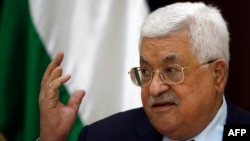Palestinian Authority President Mahmoud Abbas announced plans Monday to meet with the Palestinian Liberation Organization and Fatah later this month to devise new policies toward Israel, the United States and Hamas in the midst of rising tensions with the three countries.
In May, U.S. President Donald Trump broke with decades of unofficial policy by recognizing Jerusalem as Israel’s capital and announcing plans to move the U.S. embassy there. In September, the U.S. State Department said it would stop funding a United Nations agency that provides aid to Palestinian refugees, calling it "irredeemably flawed."
Relations between Gaza-based Hamas and Abbas’ own Fatah have become increasingly tense, as well. After years of the two parties governing their territories as separate governments, Abbas issued an ultimatum Friday following stalled talks: Cede control of the Gaza Strip to the Palestinian Authority by the end of the month, or the organization's funds will cease flowing into the region.
Now, Abbas said it is time to figure out a new way of doing things.
"I think what we will see in these meetings are decisions to activate existing resolutions. For example, withdrawing the PLO’s recognition of Israel, of renouncing security coordination with Israel, of terminating the security relationship with the United States, and of severing all further PA funding to the Gaza Strip," said Mouin Rabbani, a senior fellow at the Institute for Palestine Studies.
"But in practice on past performance, I think what’s likely is that the only resolution that will actually be implemented are those directed, ironically, against the Palestinian people in the Gaza Strip," said Rabbani.
Adding to the strife are concerns that Egypt may broker a truce between Israel and Hamas without the involvement of the PA, further undermining its authority.
"The implementation of this agreement, unlike previous proposals, would not be built on the premise of a reunification of Palestinian governance," said Mouin, "but rather on its separation."

